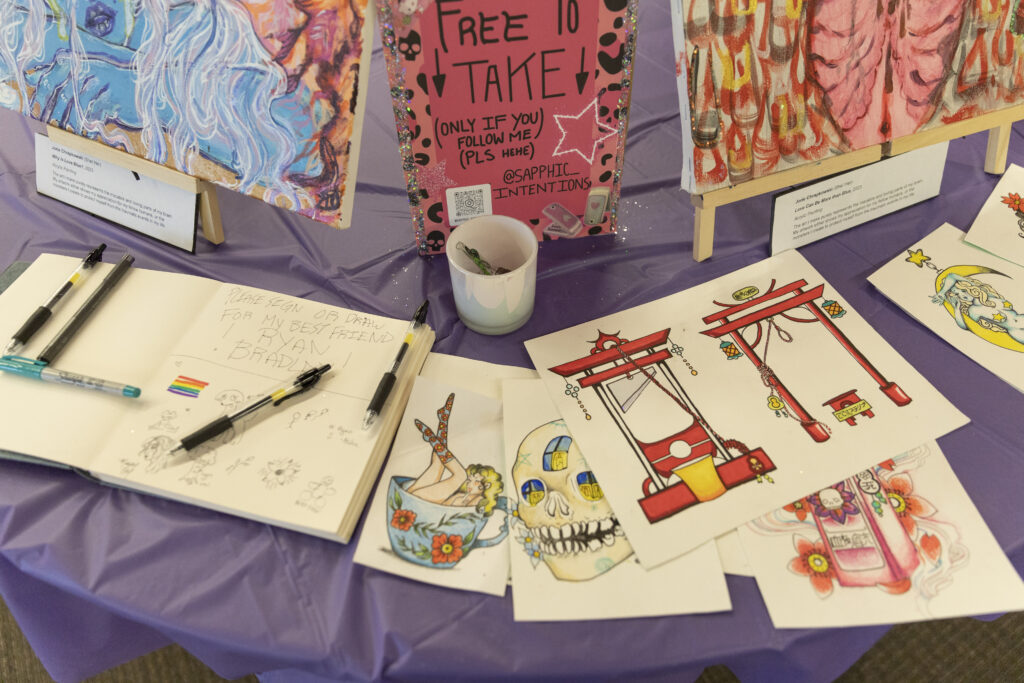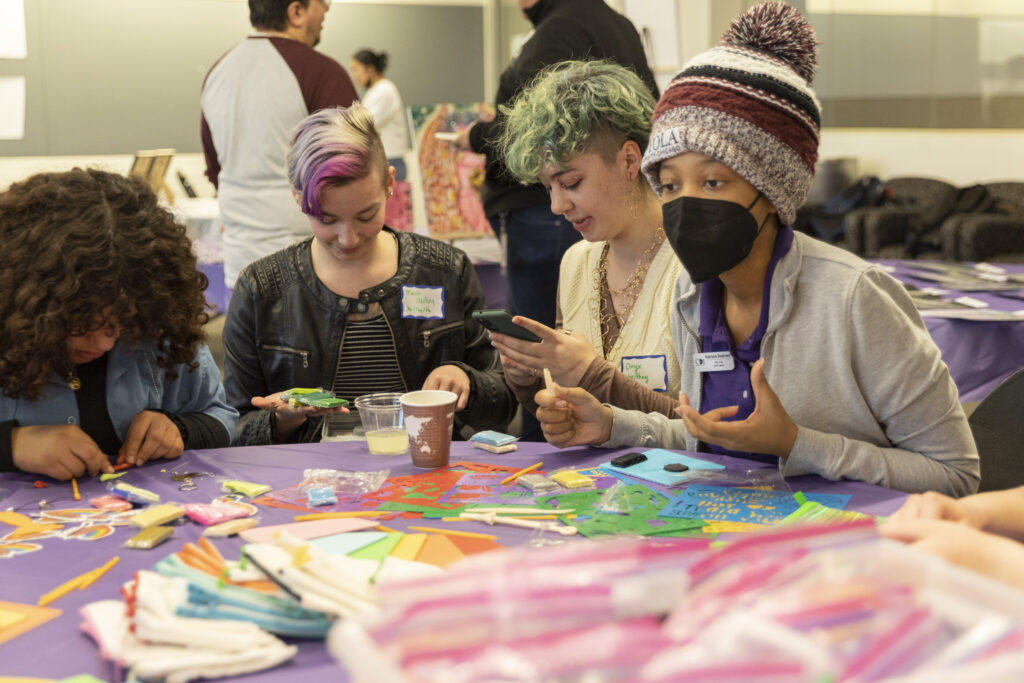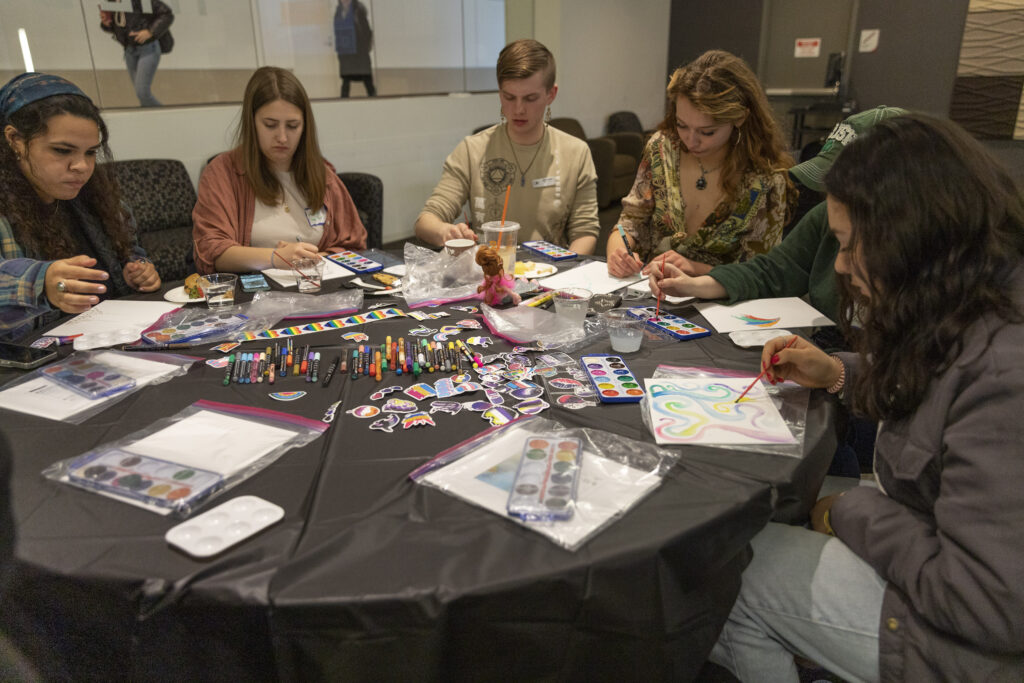What does it mean to be resilient? With recent attention on anti-LGBTQ+ legislation across the country, the term is a lived reality for members of the LGBTQ+ community. It was also the theme of Loyola’s March 30 Queer Art Show.
Queer Art Show: Creating Community One Brush Stroke at A Time
What does it mean to be resilient? With recent attention on anti-LGBTQ+ legislation across the country, the term is a lived reality for members of the LGBTQ+ community. It was also the theme of Loyola’s March 30 Queer Art Show.
Loyola’s Center for Diversity and Inclusion (CDI) collaborated with Rainbow Connection, an organization dedicated to creating a safe space for LGBTQ+ students, to host the art show which focused on “Resistance and Resilience.” Members of the LGBTQ+ community were able to showcase their work from poetry to pottery, the Damen Den welcomed queer art — with an emphasis on the artists.
Abby Simpson, vice president of the Rainbow Connection, helped co-host the event. With queer identities under attack, the theme is about finding strength and power in community, the 22-year-old said.

“Art is an expression of your inner-self,” Simpson said. “Queer people are beautiful in any form they come.”
Queer tattoo artist and friend of a Loyola student, Jodie Chrapkowski showcased three pieces of artwork representing the dark, beautiful and emotional corners of her mind, she said. The artwork depicted stages of queer emotions, titled “Why Is Love Blue?” and “Love Can Be More Than Blue.”
“My artwork either shows my appreciation for my fellow humans, or the monsters I create to protect myself from the traumatic events of my life,” read the artwork’s description.
“Art is an expression of your inner-self,” Simpson said. “Queer people are beautiful in any form they come.”
Abby Simpson, Vice President of the Rainbow Connection
“I needed something to feel like I was special or important,” Chrapkowski said.

With the event being her first art show, Chrapkowski said being in a room of people with similar life experiences gives her a sense of comfort.
Simpson said finding a space for queer artists is more important than ever due to recent political turmoil revolving around the LGBTQ+ community.
Among the anti-LGBTQ+ bills introduced over the past few years, Tennessee’s anti-drag laws stick out to Simpson — a Tennessee native. Simpson said seeing people speak up about the ban in her home city is critical. Drag has a rich cultural history, she said. Drag is a type of entertainment where people dress up and perform, often in highly stylized ways, according to the National Center for Transgender Equality.
First-year Lucie Pitt is the artist behind the piece titled “Sickening!” The collage on canvas is a commentary on anti-drag laws, according to Pitt. Having a space to showcase their art and what it means to be queer in art creates freedom to speak out, Pitt said.
Pitt’s art piece features a collage of Tennessee Governor Bill Lee, Tennessee based drag queens, Aura Mayari and Bella DuBalle and notable queer activists, Marsha P. Johnson, Stormé DeLarverie, Miss Major Griffin-Gracy and Sylvia Rivera with a trans flag background on black canvas.
“I was a little nervous it would be too political or too polarizing,” the 19-year-old said. “It reigns true to the current feelings of the ‘anti’ legislation.”
Along with their artwork, Pitt brought zines from Instagram page Protect Trans Health TN (@protecttranshealthtn). The zines offer information on laws being passed, resources to take action to help trans youth and mutual aid donation sites.
Senior Becca McCue attended the event to support her friend, artist Nicole Ficklin. McCue said having an event for queer artists to show their work is a powerful, celebratory move by Loyola.
“Queer art is a beautiful concept,” McCue said. “It often has messages that portray the artist’s stories and struggles.”
Ficklin submitted “We Were In The Garden, Too” to the show after creating it for a ceramics class at Loyola. The ceramic piece depicted queer people in the Garden of Eden through two women kissing. With the creation story used to undermine queer existence, the piece offers a different perspective, Ficklin said. A blatantly queer event that exists within Loyola’s values shows religion and queer identity can coexist, the 21-year-old said.

“If the Garden is a place of origin and belonging, we were there — and we remain, everywhere, tending to each other,” read the stoneware’s description.
“No matter what queer people face, we are always going to be here,” Ficklin said.
Sophomores Sofia Luciano and Madeleine Brix attended the event to support their suitemate, Anastasia Boudreaux, who works for Queer Undergraduates of Empowerment, Support & Triumph (QUEST). Luciano was drawn to Ficklin’s stoneware piece.
“Having a place where Loyola shows its support that’s open to everyone and in a campus building is a step forward in the community,” Luciano said.
QUEST will be hosting a Q-Celebration Brunch on Saturday, April 15 and QTBIPOC, a space intended for Queer Trans Black and Indigenous People of Color, on Thursday April 19.
Rainbow Connection will be partnering with the Department of Programming (DOP) for Drag Race, which includes performances from professional queens and student performers on April 14.
Featured image by Holden Green | The Phoenix
Topics
Get the Loyola Phoenix newsletter straight to your inbox!



